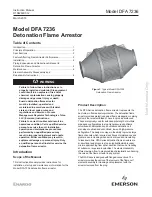
Pipe Length
Extended lengths of pipe allow the flame to advance into more
severe states of flame propagation such as high-pressure
deflagration and detonations. Although the Enardo detonation
flame arrestor is not limited by pipe length, using a minimum
length is a preferred design and installation practice.
Bends and/or Flow Obstructions
CAUTION
For maximum safety, avoid bends and flow
obstructions within 10 pipe diameters on the
protected side of the detonation flame arrestor.
Valves or other equipment that can obstruct
the flow due to restricting the piping flow area
(e.g. partially closed valves) shall be reviewed
to ensure that they cannot be in a partially
closed position during normal operation. Flame
transmission can occur due to restrictions on
the downstream side of the flame arrestor.
it is required that a temperature alarm and
shutdown system must be installed.
If the temperature sensor(s) indicate a
temperature excursion beyond anticipated
normal operating temperature, shutdown
should be initiated and review of the process
should be commenced, as necessary.
Maximum initial operating pressure is the pressure of the
system at or near static flow conditions. High pressure
deflagration and detonations can occur more easily at
higher system operating pressures than at pressures near
atmospheric. Elevated pressures condense the ignitable gas
giving the flame more matter and energy to release thereby
boosting the flame heat intensity.
Unstable (over driven) detonations exist during a deflagration
to detonation transition (DDT) before a stable detonation is
reached. This is the most severe condition where pressures
and velocities are at maximum values. Detonation arrestors
rated for unstable detonations may be placed at any location
in a piping system, provided that installation is in accordance
with all sections of this manual.
/
-
-
Detonation
Flame
Arrestor
Housing
Size
Connection
Size
IEC
Gas
Group
Housing
Material
Element
Material
Connection
Type
Options
DFA =
Concentric
72 = 72 in.
36 = 36 in.
IIA (D)
C = Carbon steel
4 = 304 SST
6 = 316 SST
4 = 304 SST
6 = 316 SST
F = Flat face
flange
R = Raised face
flange
1 = Drain Plug
2 = Pressure Tap
3 = Temperature Probe Tap
4 = Miscellaneous
5 = Protective coating
6 = Special feature
Figure 2.
Cut-away view of DFA Series Detonation Flame Arrestor
Figure 3.
DFA Series Detonation Flame Arrestor Available Constructions and Model Numbering System
3
Model DFA 7236
North America
Only


























